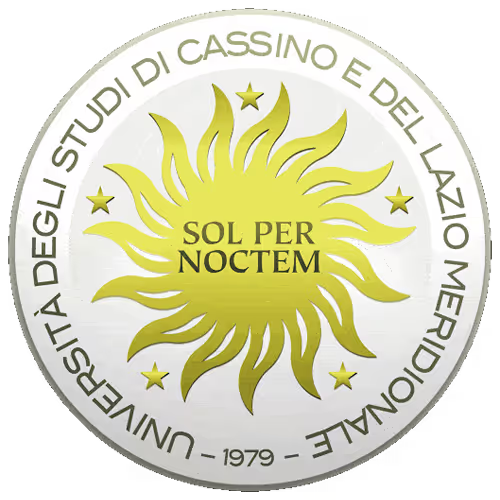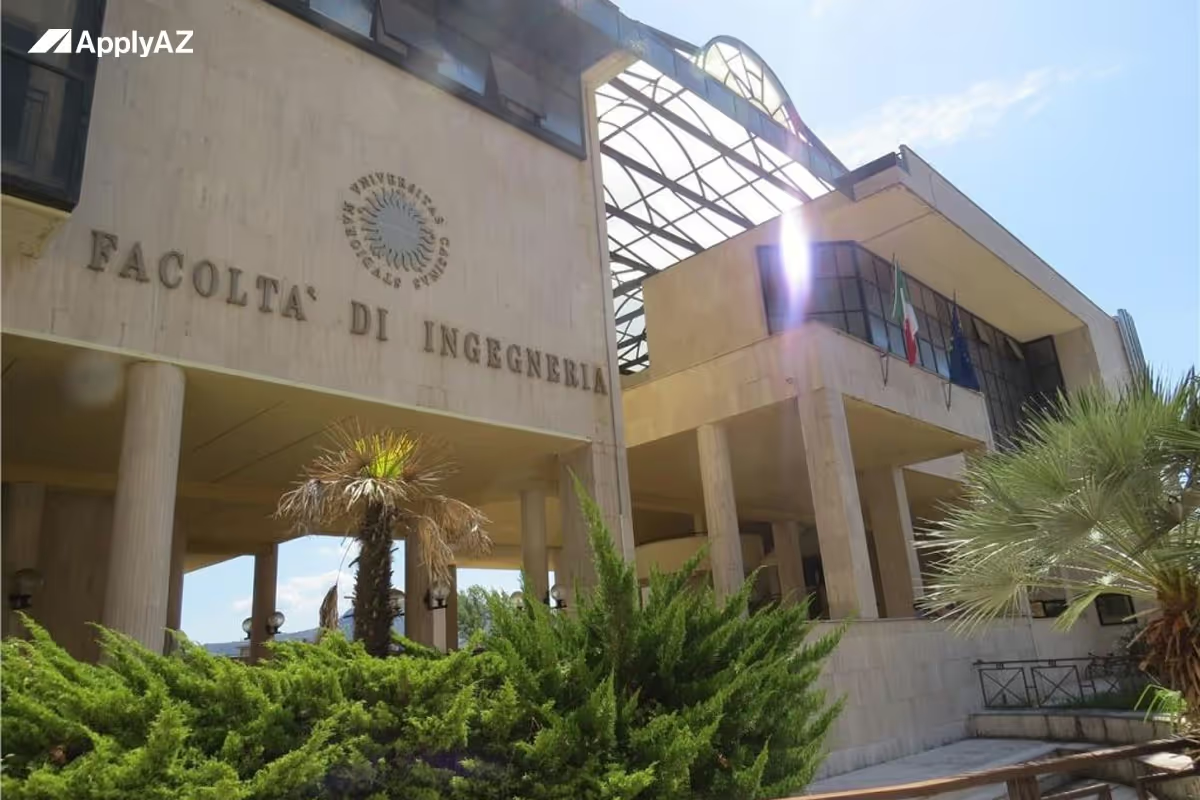Heading
Heading








University of Cassino and Southern Lazio
A public university with modern roots and global goals
The University of Cassino and Southern Lazio opened in 1979 yet quickly secured a seat among innovative English‑taught programs in Italy. It now hosts five academic areas: Engineering, Economics and Law, Humanities, Sport Science, and Education. International rankings list its mechanical engineering and legal studies among Italy’s top twenty. Degree tracks taught fully in English—such as Automotive Engineering and Global Economy—let you study in Italy in English while paying the modest fees of public Italian universities. For budget‑minded applicants, the DSU grant and other scholarships for international students in Italy can slash yearly costs to figures close to some tuition‑free universities Italy highlights.
Cassino: small‑city life between Rome and Naples
Cassino sits in a green river valley one hour by fast train from both Rome and Naples. About 35 000 residents and 10 000 students give the town an easy blend of quiet and activity. Shared flats near campus rent for €220–€280 monthly, and the university canteen serves full meals for under €4. Winters stay mild at 8 °C; summers reach 30 °C with mountain breezes from nearby Monte Cassino. Local buses, discounted for students, link dorms to lecture halls, train station, and shopping streets. Weekends might bring a quick trip to Rome’s museums—or a hike through the Abruzzo National Park an hour east.
What students do after class
- Pick‑up football on synthetic pitches behind the engineering block.
- Thursday language‑exchange nights where Erasmus groups practise Italian slang.
- Classical concerts inside the rebuilt Benedictine Abbey of Monte Cassino.
Learning that connects to industry
Key regional sectors include automotive manufacturing, advanced materials, logistics, and defence electronics. Stellantis operates Europe’s largest Fiat plant 15 km away; its innovation hub offers internships in robotics, lean production, and supply‑chain analytics. The nearby aerospace cluster needs composite‑materials analysts and quality engineers, while agritech start‑ups develop smart‑irrigation systems for olive farms. The university’s Career Service matches students to 1 200 placement offers each year, many of which accept English as the working language. Research groups in metal additive manufacturing, renewable energy storage, and European competition law draw EU Horizon funding—opening paid assistant slots that count toward thesis credits.
Relevant industries by degree path
- Engineering: automotive, aerospace, renewable energy
- Economics & Law: logistics, EU procurement, fintech compliance
- Humanities: cultural‑heritage tourism, translation services
- Sport Science: performance analytics with Serie B football clubs
Funding routes and cost control
Cassino’s base tuition ranges from €1 000 to €2 200 per year depending on household income. International applicants may compete for:
- DSU grant – tuition waiver, meal vouchers, rent help, and up to €7 000 cash per year.
- Merit scholarships – fee cuts for high GPAs or language certificates.
- Research fellowships – paid hours in labs testing battery electrodes or studying EU competitiveness.
- Erasmus+ mobility funds – cover a semester in Germany, Poland, or Spain.
Stack these sources, and many students study almost cost‑free while living in the heart of Italy.
Why Cassino earns your consideration
- Personalised teaching: classes average 25 students; professors remember your name.
- Strategic location: one hour to Rome’s culture or Naples’ coastline yet surrounded by quiet hills that keep focus strong.
- Industry doors: on‑site automotive giant, aerospace labs, and logistics corridors along the A1 motorway.
- Affordable lifestyle: low rents, subsidised meals, and generous DSU grant support.
- English pathways: grow with international peers through degrees designed for global careers.
A quick vision of your week
Monday: finite‑element lecture, afternoon lab measuring engine‑block vibration.
Tuesday: Italian crash course followed by team project at the Fiat innovation hub.
Wednesday: write a policy brief on EU carbon tariffs, then sports‑analytics club practice.
Thursday: Erasmus train trip to Naples for volcanic‑risk fieldwork.
Friday: research meeting on lithium‑ion safety, then pizza night with classmates.
Cassino pairs academic depth with an accessible European lifestyle—an attractive mix for students seeking quality and value in equal measure.
In two minutes we’ll confirm whether you meet the basic entry rules for tuition-free, English-taught degrees in Italy. We’ll then quickly see if we still have space for you this month. If so, you’ll get a personalised offer. Accept it, and our experts hand-craft a shortlist of majors that fit your grades, goals, and career plans. Upload your documents once; we submit every university and scholarship application, line up multiple admission letters, and guide you through the visa process—backed by our admission-and-scholarship guarantee.
Economics and Entrepreneurship (LM‑56) at University of Cassino and Southern Lazio
1. Why this master’s matters in the global business landscape
In the first lines you meet all three essentials: this is one of the English‑taught programs in Italy that lets you study in Italy in English while paying fees set for public Italian universities and securing aid that rivals some tuition‑free universities Italy promotes. The Economics and Entrepreneurship LM‑56 teaches you to read macro cycles, crunch firm data, and design ventures that solve real pain points. Lecturers mix academic research with start‑up practice, so every theory block ends in an investor‑style pitch or policy brief.
2. Programme design: 120 ECTS, four semesters, endless opportunity
Semester 1 – foundations in modern economics
Advanced Microeconomics (8 ECTS)
Game theory, pricing power, behavioural twists; Python labs model duopoly wars and bounded rational decisions.
Macroeconomic Dynamics (8 ECTS)
Growth, monetary policy, crisis contagion; team projects build DSGE models to test rate shocks.
Quantitative Methods for Business (6 ECTS)
Stata, R, and SQL; tasks show how data scraping reveals export niches.
Entrepreneurial Mind‑Set (4 ECTS)
Lean canvas, value propositions, pitching basics; each student outlines a venture idea.
English for Economics (4 ECTS)
Precision writing, presentation drills, and citation rules ensure clear thinking in global teams.
Semester 2 – finance, markets, and legal frames
Corporate Finance and Valuation (8 ECTS)
DCF, comparables, and real options; Harvard cases on tech IPOs train number sense and storytelling.
International Trade and Policy (6 ECTS)
Gravity models, WTO pillars, sanctions; you evaluate tariff effects on supply chains.
Digital Business Analytics (6 ECTS)
Machine learning, dashboarding, A/B testing; groups predict churn for a SaaS mock‑up.
Innovation Law and Intellectual Property (4 ECTS)
Patents, trademarks, open licences; moot courts sharpen argument logic.
Elective A (6 ECTS)
Pick FinTech, Sustainable Finance, or Tourism Economics to shape your personal story.
Semester 3 – venture creation and social impact
Entrepreneurship Lab (10 ECTS)
Six‑week sprint: idea validation, prototype, MVP metrics; real mentors critique weekly.
Strategic Management in Emerging Markets (6 ECTS)
Scenario planning, institutional voids, alliance building; students craft market‑entry decks.
Impact Measurement and ESG Reporting (6 ECTS)
SDGs, carbon audits, social ROI; assignments score ventures on triple bottom lines.
Leadership, Ethics, and Negotiation (4 ECTS)
Role‑plays in mergers, social dilemmas, and board disputes; feedback stresses empathy and clarity.
Elective B (4 ECTS)
Choices include Cultural Economics, Circular Business Models, or Sports Economics.
Semester 4 – internship and thesis
Professional Internship (18 ECTS)
450 hours in a start‑up, NGO, think tank, or finance hub; weekly reflections link field tasks to theory.
Master’s Thesis (30 ECTS)
Original research or venture plan. Topics range from “Blockchain traceability for agrifood SMEs” to “Green bond uptake among family firms.” Output aims at journal submission or seed pitch.
3. Teaching method: flipped, agile, and feedback‑rich
Professors post ten‑minute video capsules and concise readings so live sessions pivot to problem solving. Each four‑week sprint follows a simple rhythm:
- Plan – define deliverables, metrics, and roles.
- Execute – gather data, build models, or interview stakeholders.
- Demo – deliver five‑minute stand‑ups in clear English.
- Retro – review errors, design next sprint.
Lab manuals keep sentences short (under 80 words) to speed comprehension at CEFR B2 level.
4. Research and facilities
- Quant Lab – Bloomberg, Refinitiv, StataCloud; datasets from IMF, OECD, and Crunchbase.
- Entrepreneurship Garage – 3D printers, AR headsets, and podcast studio for fast prototyping and content.
- Behavioural Insights Hub – eye‑tracking and galvanic sensors for UX studies.
- Policy Studio – green‑screen and teleprompter for video briefs to NGOs and ministries.
Students join EU Horizon or Erasmus+ projects on SME resilience, AI governance, or rural innovation.
5. Internship network and live projects
Hosts include consultancy firms, fintech accelerators, energy co‑ops, and development agencies. Sample tasks:
SectorProjectDeliverablesFinTechLending algorithm fairness auditPython code + policy memoCircular FashionSupply‑chain LCAEmission dashboard + investor deckDevelopment NGOMicro‑credit impact studyStata analysis + 1 000‑word briefPublic ResearchRegional export gap mappingInteractive map + strategy paper
Internship mentors co‑sign learning contracts; 40 % hire their interns full‑time within a year.
6. Career outcomes and alumni stories
A survey across three cohorts (150 grads) shows 92 % employed or in PhD within six months. Typical roles:
- Business analyst in Big 4 or boutique consultancies.
- Strategy associate in scale‑ups targeting EU markets.
- ESG officer guiding sustainability metrics.
- Trade‑policy researcher in think tanks.
- Co‑founder of ed‑tech or agritech ventures.
Employers praise graduates’ mix of data literacy, legal awareness, and concise English writing—skills honed through sprint workshops and investor‑style demos.
7. Funding your studies: DSU grant plus layered aid
7.1 DSU grant
- Tuition waiver, rent subsidy, meal vouchers, and stipend up to €7 000 per year.
- Open to EU and non‑EU with income caps.
- Renewal needs 30 ECTS passed yearly.
7.2 Additional scholarships for international students in Italy
- Merit fee cuts for GPAs > 3.5/4 or GMAT ≥ 650.
- Teaching assistantships (150 paid hours) in data labs.
- Research bursaries through faculty projects.
- Erasmus+ mobility grants covering living costs for a semester abroad.
Combine these and net costs can rival those at tuition‑free universities Italy often cites—yet you keep boutique class sizes and top‑tier resources.
8. Admissions checklist and ApplyAZ support
- Bachelor’s in economics, management, or related (180 ECTS).
- Prerequisites – micro, macro, math, stats, basic coding or spreadsheet skills.
- English proof – IELTS 6.5, TOEFL 90, or prior English‑medium degree.
- Package – transcript, CV, passport, motivation letter, two references.
- Interview – 20 minutes online: discuss data projects and entrepreneurial goals.
ApplyAZ audits your dossier, flags credit gaps, suggests bridging MOOCs, and drafts DSU forms—maximising funding odds and peace of mind.
9. Week‑in‑the‑life snapshot
Monday – Lecture on behavioural biases; afternoon lab crawling e‑commerce reviews for sentiment.
Tuesday – SDG metrics workshop; evening peer review of Lean Canvases.
Wednesday – Guest founder talks pivot from freemium to B2B; group tweaks revenue model.
Thursday – Stata bootcamp runs panel fixed‑effects on export data.
Friday – Elevator‑pitch demos and instant faculty critique; weekend reading on green bond taxonomy.
Short bursts of theory followed by action keep motivation high and learning sticky.
10. Key takeaways—why this LM‑56 belongs on your list
- Entire course in English, removing language friction.
- Small cohorts guarantee feedback on every spreadsheet, pitch, and code block.
- Hands‑on venture labs and policy studios turn theory into market or societal value.
- Public‑university fees plus DSU grant make study affordable.
- Additional scholarships bolster finances; layered support mimics tuition‑free conditions.
- Strong placement in consulting, fintech, ESG, and doctoral routes.
- You build life‑cycle thinking, data muscle, legal basics, and leadership poise—an uncommon combo.
Ready for this programme?
If you qualify and we still have a spot this month, we’ll reserve your place with ApplyAZ. Our team will tailor a set of best-fit majors—including this course—and handle every form and deadline for you. One upload, many applications, guaranteed offers, DSU grant support, and visa coaching: that’s the ApplyAZ promise. Start now and secure your spot before this month’s intake fills up.

They Began right where you are










